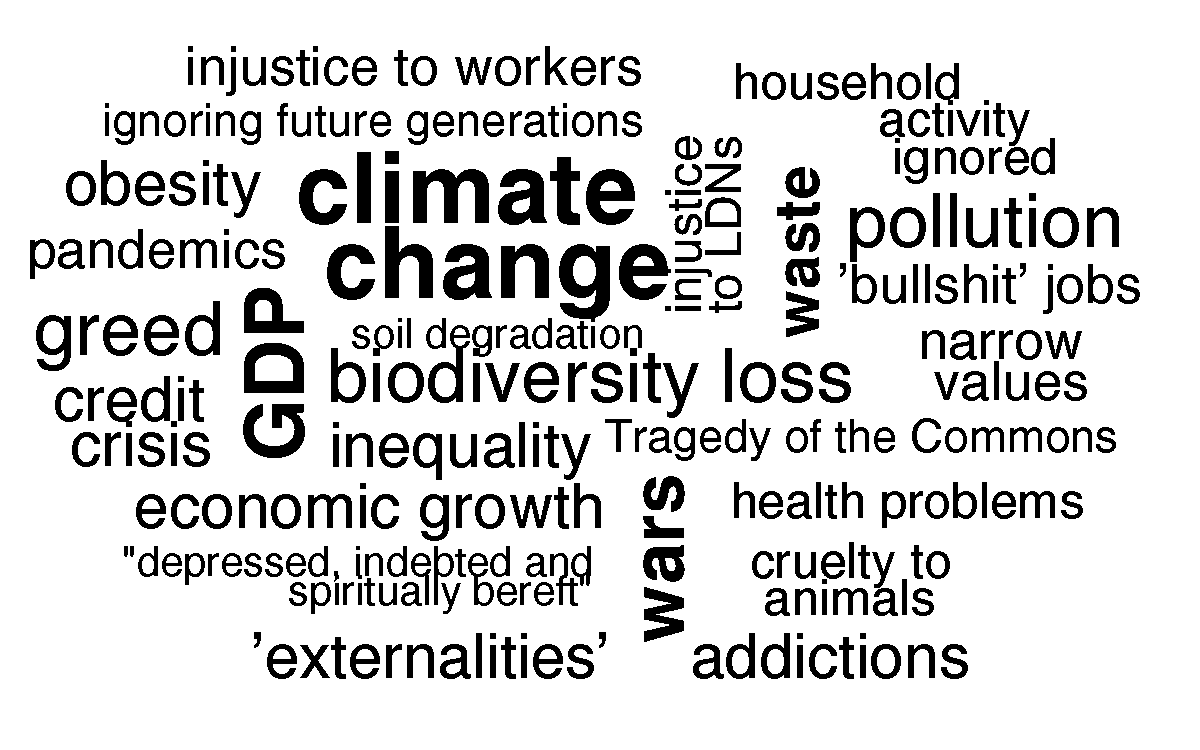
(This page best viewed in a narrowish window.)
What's wrong with economics? Here are some suggestions that people have discussed over the past 50 years or so:

Some of those are problems caused by the way the economy operates, some are problems within economics itself, its theories and rules. (We use the word "economics" very broadly; see Note: Economics.)
We dig out deeper answers to that question, uncovering deeper roots to the problems and proposing more radical and yet practical solutions. This is partly due to the different perspectives we take: oriented to everyday experience, embracive, philosophical, religion-respecting, with a deeper understanding of theory, and aiming economics at Multi-aspectual Overall Good.
A veritable plethora of proposals has emerged over the past 50 years about what to do (in random order):
De-growth; Sharing Economy; Microfinance; God's Good Economy; Redeeming Economics; Freakonomics; Gift Economy; Digitalization; Relational Economics; Wellbeing economics; Value of Everything; Value(s); Human Development Index; Biodiversity; Economics of Arrival; Economics of Enough; Economy for the Common Good; Economy of Communion; Utopia for Realists; Poor Economics; Gross Happiness Index; Blossoming Economy; Circular Economy; Christianity and the New Spirit of Capitalism; Participatory Market Systems Development; Mission Economy; Post-Growth; Natural Order of Money; True Price Movement; Doughnut Economics; Foundational Economics; Development Economics; Civil Economy; Environmental Economics; New Environmental Economics ...
Each proposal addresses one or two of the problems and offers some useful insight. None address them all. No overall view. No integration.
We need to rethink economics from the foundations up with fresh perspectives. It is not economics itself that is necessarily problematic, but rather, how we use it and how it has developed. To help us, we bring six perspectives to guide our Rethink, which are described below. It may be of interest to all, not just Christians, and not just philosophers or economists.
Following is an outline. For more, see Introduction to the Main Rethink
| Four Main Principles | Six Perspectives |
|---|---|
|
The following principles that guide our thinking arise from questioning fundamentals, with the help of six perspectives listed opposite. We introduce them as questions.
1. Have economics and the economy lost their way? In Chapter 4, we discuss the meaning, mandate and mindset of economics as integral economics and not just from outside. Example Key takeaway: Economics as 'serving' other spheres of life, all together aimed at Multi-aspectual Overall Good, rather than being the most important. 2. Is economics too narrow in what it values? In Chapter 5, we argue that a wide range of values is important, to be taken account of within economics theory as well as practice - especially the natural world, unpaid household work, and even subtle things like happiness, aesthetics and faith. Example Key Takeaway: Use Dooyeweerd's Aspects to understand diversity of value(s). 3. Do economic predictions keep going wrong? Do we truly understand economic activity? Chapter 6 presents a multi-aspectual idea of functioning and repercussions, in which economics theory and practice take account of other spheres of human life rather than treating them as 'externalities'. Example Key Takeaways: 1. Take every aspect into account, especially hidden mindset and attitude. 2. Here is a way to include unpaid work. 4. How much damage does the economy do to the world, to human health and happiness? Chapter 7 finds a way to properly distinguish harmful and useless economic activity from good in multiple aspects, rather than just lump them all together as GDP and the desire for growth do. Example Key Takeaways: 1. GDP should subtract Harmful economic activity from Good, rather than add it. 2. A way to decide where growth and de-growth should occur.
|
1. Pre-theoretical, everyday perspective. Derive ideas from what actually happens as well as from theory.
2. Embracive perspective. Theory and practice, left- and right-wing, socialism and capitalism, conventional and recent, heterodox and orthodox all offer valid insights. 3. Dooyeweerd's philosophy to underpin our understanding of (economic and all) reality. Especially his multi-aspectual viewpoint. 4. Religion-respecting perspectives offer important insights that economics should not overlook, from religion in general, Judaism and Christianity more specifically. 5. Multi-aspectual Overall Good as what all economic activity should contribute to. 6. Engage with all extant thought: listen, affirm, critique, enrich. |
Ten chapters in four parts,
Overview poster and its explanation.
Even Older Rethink (October 2021):
See also:
This is one room in the Christian Thinking Space
Created: 3 February 2021 Last updated: 18 February 2021 economics of biodiversity. 25 February 2021 intro, JRI, link to Home. 23 March 2021 Heywood. 5 April 2021 non.essentials. 13 April 2021 what is economics. 17 April 2021 added commons. 21 May 2021 explan. econ.biodiv. 17 June 2021 Fuller intro text. 25 June 2021 reith.findings, mazzucato. 2 July 2021 rename reith.findings to xn.rethink. 3 August 2021 MNEs-cmts-RLFG210803.pdf. 9 September 2021 rldg-ws236 link. 8 October 2021 doughnut. 29 October 2021 xnr.smy, and heading for responses. 19 December 2021 Headings, box. 19 February 2022 Vignette from xnr. 20 May 2022 econ.good.bad. 23 May 2022 rldg. 12 August 2023 better start. 18 November 2023 redid page, link to poster, removed link to discussions. 5 December 2023 link2 circular. 18 December 2023 reinstated discussion. 22 December 2023 new intro, with pix etc. 29 December 2023 ecx ok. 22 February 2024 rw intro and add Skidelsky. 24 February 2024 redone intro to show pillars and perspectives of Rethink. 26 February 2024 rw principles. 20 March 2024 link to n-econ. Moved story and characterization of ecx to wee.story.html; rw intro a bit. 26 March 2024 6 persps not 7. 17 January 2025 intro: deeper roots. 22 May 2025 greenberg25-property. 1 July 2025 food.industry.harm